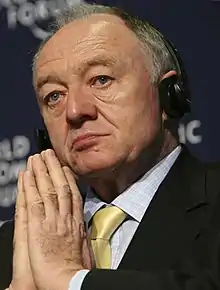| |||||||||||||||||||||||||||||||||||||||||
All 1,861 on all 32 London boroughs | |||||||||||||||||||||||||||||||||||||||||
|---|---|---|---|---|---|---|---|---|---|---|---|---|---|---|---|---|---|---|---|---|---|---|---|---|---|---|---|---|---|---|---|---|---|---|---|---|---|---|---|---|---|
| Turnout | 38.9% ( | ||||||||||||||||||||||||||||||||||||||||
| |||||||||||||||||||||||||||||||||||||||||
 Results by Borough in 2006. | |||||||||||||||||||||||||||||||||||||||||
Local government elections took place in London, and some other parts of the United Kingdom on Thursday 4 May 2006. Polling stations were open between 7am and 10pm.
All London borough council seats were up for election. Mayoral contests were held in the London Boroughs of Hackney, Lewisham, and Newham.
The London Conservatives slightly increased their vote share, made 131 council seat gains and won control of 6 new councils, while London Labour saw its vote share decline by 6% and lost 8 councils and 182 seats. The 2006 result was one of Labour's worst local election results in London, with its share of the vote (27.9%), its number of council seats (684) and number of councils (7) all at their lowest levels since 1968. Conversely, the Conservatives won the most seats, the most councils and the most votes in London for the first time since 1982.
The Labour decline was also accompanied by a rise in the number of minor party councillors, mostly concentrated in specific local authorities. Respect won 15 council seats, the British National Party won 14 and the London Green Party won 12. The Christian Peoples Alliance and the Socialist Party also won two seats each. In total, the election saw 76 minor party or independent councillors elected in London, a figure which remains the highest on record.
Altogether, minor parties and independents won 17% of the vote, the highest ever vote share for 'other' parties until the local elections of 2014.
Results summary
| Party[1][2] | Votes won | % votes | Change | Seats | % seats | Change | Councils | Change | |
|---|---|---|---|---|---|---|---|---|---|
| Conservative | 746,177 | 34.9 | +0.8 | 785 | 42.2 | +133 | 14 | +6 | |
| Labour | 596,570 | 27.9 | -6.0 | 684 | 36.8 | -182 | 7 | -8 | |
| Liberal Democrats | 443,772 | 20.7 | +0.1 | 316 | 17.0 | +9 | 3 | ±0 | |
| Green | 169,160 | 7.9 | +2.4 | 12 | 0.6 | +11 | 0 | ±0 | |
| Respect | 38,662 | 1.8 | n/a | 15 | 0.8 | +15 | 0 | ±0 | |
| BNP | 21,625 | 1.0 | +0.6 | 14 | 0.8 | +14 | 0 | ±0 | |
| Others | 123,713 | 5.8 | +0.4 | 35 | 1.9 | +2 | 0 | ±0 | |
| No overall control | n/a | n/a | n/a | n/a | n/a | n/a | 8 | +2 | |
- Turnout: 2,284,882 voters cast ballots, a turnout of 38.9% (+7.1%).[3]
Council results
Overall councillor numbers
The largest party in terms of councils and councillors became the Conservative Party after this election, with losses by the Labour Party and a small increase in share of the vote to the Liberal Democrats. Smaller national parties made significant gains, with the British National Party and Respect having the second-largest number of councillors in the London Borough of Barking and Dagenham and Tower Hamlets (respectively). The Green Party also saw its gains concentrated on one area to achieve the third most councillors in the London Borough of Lewisham. Scattered across boroughs, unaffiliated residents groups won 24 council seats.[4]
| London local elections 2006
Councillor statistics | |||
|---|---|---|---|
| Party | Seats | Gain/loss | |
| Conservative | 785 | +132 | |
| Labour | 685 | -181 | |
| Liberal Democrats | 317 | +8 | |
| Respect | 15 | +12 | |
| BNP | 14 | +14 | |
| Green | 12 | +10 | |
| CPA | 3 | +2 | |
| Socialist Alternative | 2 | 0 | |
| Local | 24 | ||
| Independent | 5 | ||
Mayoral results
In three London boroughs the executive function of the council is a directly elected mayor. The mayoral elections take place at the same time as councillor elections in those boroughs.
| Mayoralty | 2002 | 2006 | ||
|---|---|---|---|---|
| Hackney | Jules Pipe (Labour) | Jules Pipe (Labour) | ||
| Lewisham | Sir Steve Bullock (Labour) | Sir Steve Bullock (Labour) | ||
| Newham | Robin Wales (Labour) | Robin Wales (Labour) | ||
Ward result maps
London-wide
The map below shows the results for each ward across the whole of Greater London.

By borough
 Barking and Dagenham 2006 results map
Barking and Dagenham 2006 results map Barnet 2006 results map
Barnet 2006 results map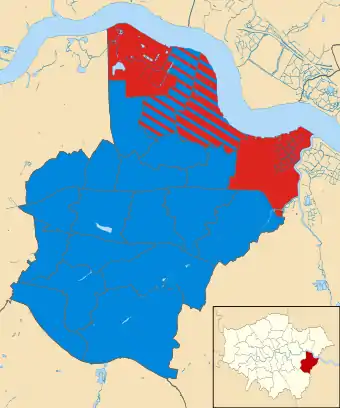 Bexley 2006 results map
Bexley 2006 results map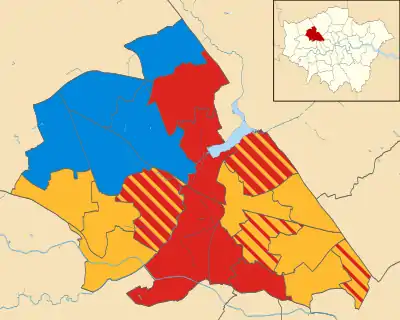 Brent 2006 results map
Brent 2006 results map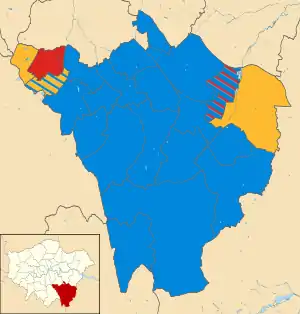 Bromley 2006 results map
Bromley 2006 results map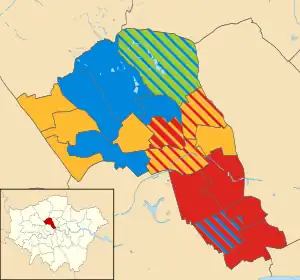 Camden 2006 results map
Camden 2006 results map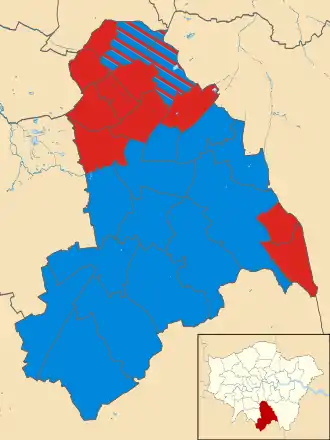 Croydon 2006 results map
Croydon 2006 results map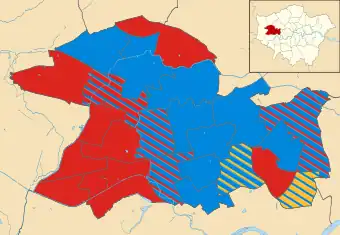 Ealing 2006 results map
Ealing 2006 results map Enfield 2006 results map
Enfield 2006 results map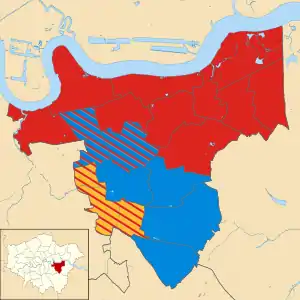 Greenwich 2006 results map
Greenwich 2006 results map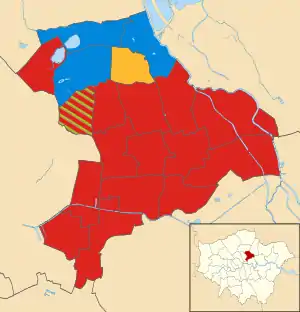 Hackney 2006 results map
Hackney 2006 results map Hammersmith and Fulham 2006 results map
Hammersmith and Fulham 2006 results map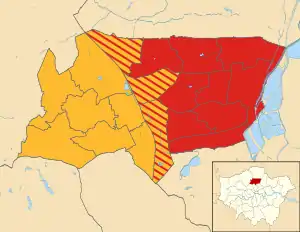 Haringey 2006 results map
Haringey 2006 results map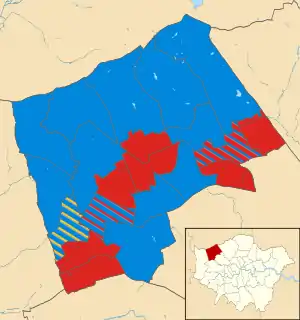 Harrow 2006 results map
Harrow 2006 results map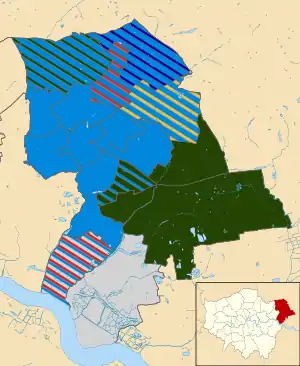 Havering 2006 results map
Havering 2006 results map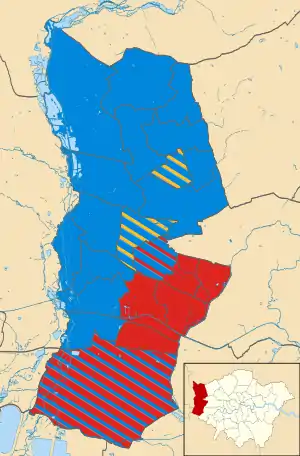 Hillingdon 2006 results map
Hillingdon 2006 results map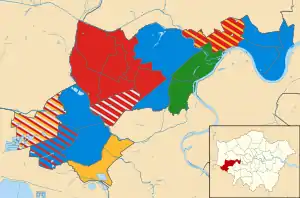 Hounslow 2006 results map
Hounslow 2006 results map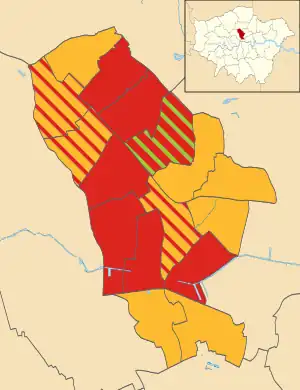 Islington 2006 results map
Islington 2006 results map Kensington and Chelsea 2006 results map
Kensington and Chelsea 2006 results map Kingston upon Thames 2006 results map
Kingston upon Thames 2006 results map Lambeth 2006 results map
Lambeth 2006 results map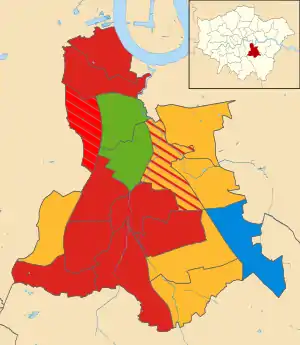 Lewisham 2006 results map
Lewisham 2006 results map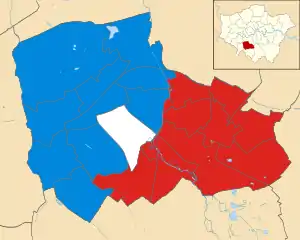 Merton 2006 results map
Merton 2006 results map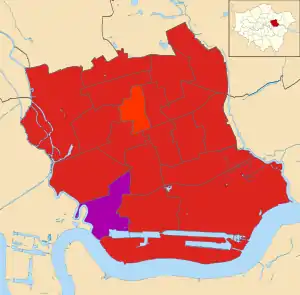 Newham 2006 results map
Newham 2006 results map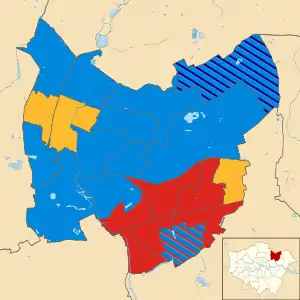 Redbridge 2006 results map
Redbridge 2006 results map Richmond upon Thames 2006 results map
Richmond upon Thames 2006 results map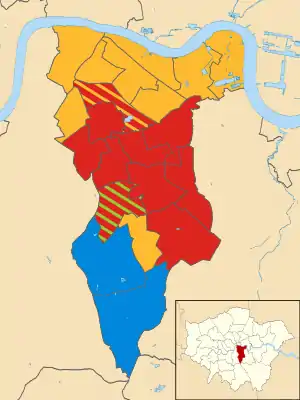 Southwark 2006 results map
Southwark 2006 results map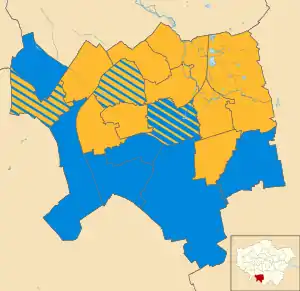 Sutton 2006 results map
Sutton 2006 results map Tower Hamlets 2006 results map
Tower Hamlets 2006 results map Waltham Forest 2006 results map
Waltham Forest 2006 results map Wandsworth 2006 results map
Wandsworth 2006 results map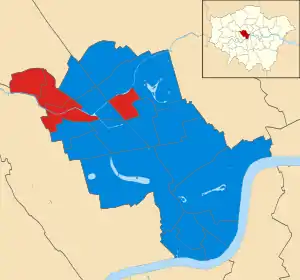 Westminster 2006 results map
Westminster 2006 results map
References
- ↑ "Year Tables". 19 December 2015.
- ↑ "Local Elections 2006". www.andrewteale.me.uk.
- ↑ "London Borough Council Elections 4 May 2006" (PDF). files.datapress.com. March 2007. Archived from the original (PDF) on 11 February 2018.
- ↑ Minors, Michael; Grenham, Dennis, eds. (March 2007). London Borough Council Elections: 4 May 2006 (PDF). Greater London Authority. ISBN 978-1-85261-232-0. Retrieved 8 September 2019.
{{cite book}}:|website=ignored (help)
- "English elections list". electoralcommission.org.uk. 2006. Archived from the original on 23 March 2008. Retrieved 8 September 2019.
- Wintour, Patrick; Muir, Hugh (17 February 2006). "Party leaders put to the test with a capital campaign". The Guardian. Retrieved 8 September 2019.

